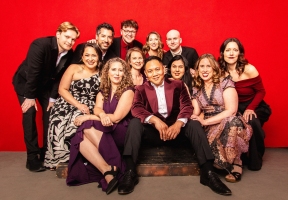By: Ashmar Mandou
 Empowering communities through the medium of music serves as the cornerstone for vocal ensemble, Chicago a cappella (CAC). For many years, Chicago a cappella has dedicated themselves to advancing the art and appreciation of ensemble singing while simultaneously promoting the music of Latin composers. In 2016, CAC launched ¡Cantaré! Chicago to bring composers from Mexico into Chicago to highlight the rich and diverse voices of the Mexican community. Throughout this month, audiences will have the opportunity to be mesmerized while listening to the distinctive voices of Mexican composers during Hispanic Heritage Month. Executive Director of CAC Matt Greenberg shares his thoughts on the importance of highlighting the works of Mexican composers and how he hopes CAC will inspire the next generation.
Empowering communities through the medium of music serves as the cornerstone for vocal ensemble, Chicago a cappella (CAC). For many years, Chicago a cappella has dedicated themselves to advancing the art and appreciation of ensemble singing while simultaneously promoting the music of Latin composers. In 2016, CAC launched ¡Cantaré! Chicago to bring composers from Mexico into Chicago to highlight the rich and diverse voices of the Mexican community. Throughout this month, audiences will have the opportunity to be mesmerized while listening to the distinctive voices of Mexican composers during Hispanic Heritage Month. Executive Director of CAC Matt Greenberg shares his thoughts on the importance of highlighting the works of Mexican composers and how he hopes CAC will inspire the next generation.
Lawndale News: Chicago a cappella opened its season with Cantaré, an exploration and celebration of Mexican music. What can people expect from the show? What do you hope they take away?
Matt Greenberg: Chicago a cappella is an ensemble of 10 singers who perform with no instruments and no conductor. From our organization’s founding over 30 years ago, we have always presented a really wide range of musical styles, including music from all over the world. Our singers are among the top professionals in the city, and our intimate concerts give audiences a chance to hear and see them in a setting where their voices really shine. We have developed longstanding relationships with composers from Mexico, starting way back in 2012 when we commissioned Jorge Córdoba to write a new work for us. Since then, we have brought many Mexican composers to Chicago as part of our educational outreach programming, working with students in Chicago schools and writing songs specifically for each choir based on the students’ ideas, their words, and their interests. The composers also wrote new pieces for our professional ensemble, and those pieces form the centerpiece of this concert. Audiences will hear fascinating and beautifully expressive works from these contemporary composers – some with amazing harmonies, some with captivating rhythms, and some with exciting, cutting-edge style. We’ll also share video introductions from the composers themselves. The program really does capture the breadth and amazing talent of this generation of choral composers living and working in Mexico.
LN: In a time when there are feelings of fear and confusion, how do you hope Cantaré uplifts the spirits of the Hispanic/Latino community?
MG: We have been working with these composers and creating strong artistic partnerships with them for over a decade, and we’ve been planning this concert for over a year. We had no idea that we’d be facing the climate of anxiety and confusion that the community is now dealing with. But in some ways, there has never been a more important time to celebrate the Mexican community in Chicago, because it allows us to share joy as an antidote to fear. We want to support the community in every way we can during this very stressful time, and we hope that by rallying around the community and coming together with music, we’ll connect our audiences with this deep well of artistry from Mexico and give everyone some hope for the future.
LN: Do you feel a sense of responsibility to showcase the diverse and vibrant work of Mexican composers? How do you hope it inspires the younger generation of Latinos?
MG: The word “Chicago” is part of our name, and showcasing the remarkable breadth of our city’s cultural heritage has always been one of our touchstones. Bringing composers from Mexico to Chicago for so many years has not only resulted in some amazing new music for choirs, but it has also touched the lives of so many school children in the city. Having a working musician from Mexico in their school’s choir room has made a deep impression on these kids. For some of them, it’s the first time they’ve sung in Spanish in their choir, and having direct input into the theme, lyrics, and even music the composer creates for them makes it even more personal.
LN: As we celebrate Hispanic Heritage Month, what message do you have about the significant contributions and achievements made by Hispanic/Latinos when it comes to the shaping the arts? How can the younger generation continue the legacy and work of their predecessors?
MG: In the choral music scene in the U.S., music by Hispanic/Latino composers—even those from Mexico, our nearest neighbor—remains highly underrepresented. There is a centuries-old history of great choral music from Mexico, and this current generation of composers demonstrates how that continues to this day. We are grateful to be able to provide a platform for this work to inspire audiences, promote broader visibility, and give voice to artists whose work is not as well-known as it deserves to be.
Chicago a cappella is hosting a series of concerts throughout the month of October and if you would like tickets to see Cantaré, visit www.chicagoacappella.org.
Photo Credit: Chicago a cappella










